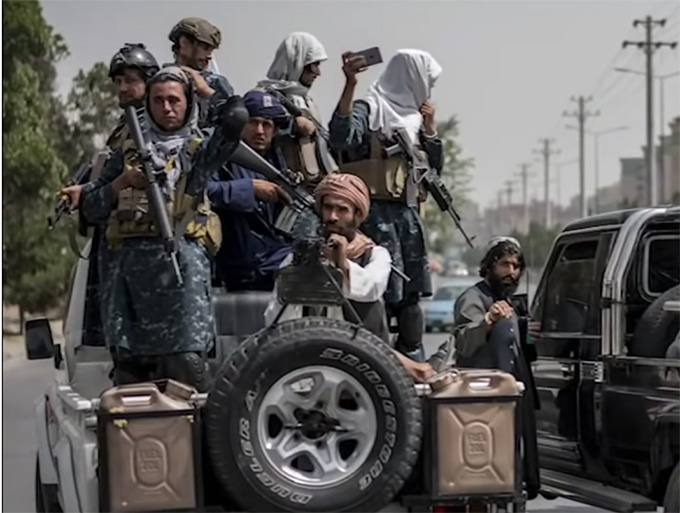
Barbara Kelemen, Asia analyst at Dragonfly, for American Security Today
The US withdrawal from Afghanistan is likely to have a geostrategic impact for Western interests rather than contribute to a major rise in terrorist threat globally.
While the Taliban takeover will probably provide some opportunities for militants to regroup and mount more attacks, this is likely to take years to manifest itself in the West.
Given China’s rising interest in the wider region and the likely blowback of deteriorating security in Afghanistan on Pakistan, there is a very high chance that the West will see its influence in the area weaken substantially in the coming years.
It would then become more likely than not that China would be better positioned to become a dominating power in South Asia, leading to geostrategic implications worldwide.
(As British forces evacuate expats and Afghans from Kabul airport, following the western withdrawal of troops from the country, what is China’s reaction? Courtesy of Forces News and YouTube. Posted on Aug 24, 2021.)
The US is highly unlikely to reverse any aspect of its policy; the recent withdrawal is only a completion of its long-held intentions.
It had already begun to slowly diminish its commitment to Afghanistan several years ago; in 2014, former President Barack Obama repeatedly stated his intention to withdraw from Afghanistan, particularly after the troop ‘surge’ he oversaw failed to bring any results or bring the Taliban to the negotiating table.
In addition, any intervention by other Western states is improbable given that over the past two decades the US has played the vital function of security guarantor to international forces in Afghanistan.
Any increased terrorist threat as a result of the Taliban takeover is likely to take years to materialize in the West.
For Al-Qaeda, the Taliban’s control of the country presents an opportunity to deepen and re-build its networks with the long-term aim of mounting attacks in the West. But much has changed since 9/11.
Most importantly, Western governments have become more able to detect and prevent internationalized plots.
Intelligence-sharing and advances in technology regarding border and aviation security are likely to continue to allow the US to mitigate terrorist threats against its interests even after the withdrawal, albeit with less access to intelligence on the operations of suspected terrorists within Afghanistan.
Recent events in Afghanistan are likely to have a profound geostrategic impact.
In particular, there is little doubt that China, building upon its established relationship with the Taliban, will become a more influential player in Afghanistan and in the wider region.
(China: “Afghanistan has turned a new page.” Taliban: “China is a friend of #Afghanistan.” What’s China’s game plan in Afghanistan? Experts decode it on WION Wideangle. Courtesy of WION and YouTube. Posted on Sep 4, 2021.)
Beijing has been pragmatically engaging with the group since the 90s and there is a high chance it would recognize the Taliban as the legitimate rulers of Afghanistan if they are able to stabilize the country and give assurances that they will prevent militants from attacking Chinese interests.
Yet even if the Taliban consolidates its control of Afghanistan, the outlook for the security environment remains poor. This is because the Taliban is likely to face major challenges to ruling the country efficiently.
Although for now, it does not face any major opposition to its rule, besides small anti-opposition forces fighting the group in the North, ethnic divides and factionalism within its ranks are likely to eventually lead to the re-emergence of localized conflicts.
At the same time, the lack of qualified personnel and the inability of the group to handle government ministries effectively will probably contribute to a prolonged period of instability and uncertainty in the country.
Such continued insecurity in Afghanistan would probably lead China to increase its indirect commitment to the country rather than intervene directly.
This would probably include more economic support to improve the local security forces or the deployment of private companies to secure its employees, and investments in the wider region, including the China-Pakistan Economic Corridor (CPEC).
Such an investment would also benefit many Chinese projects, many of which – for example, the Mes Aynak copper mine – have been stalled due to insecurity.
Finally, Pakistan is the country that is likely to suffer the most notable negative impact of the crisis.
(The Pakistani government provided help and shelter to the Taliban for many years, while denying it was doing so. The militants’ takeover of Afghanistan therefore represents a victory for Islamabad, but one that is fraught with risk. Courtesy of DW News and YouTube. Posted on Sep 15, 2021.)
According to the TerrorismTracker, an online database for monitoring terrorist activity and assessing terrorism threat and risk globally, attacks by the Pakistan Taliban have already become more frequent since the takeover, adding to the already rising threat of terrorism in major cities over the past years.

With the US support for Pakistan likely to diminish over the coming years, the country will find itself increasingly dependent on China while trying to fend off major security threats emanating from terrorist groups active in the country.
Barbara Kelemen, Asia analyst at Dragonfly has been assisting corporate security clients in navigating the ongoing security crisis in Afghanistan.
AST strives to meet a 3 STAR trustworthiness rating, based on the following criteria:
- Provides named sources
- Reported by more than one notable outlet
- Includes supporting video, direct statements, or photos
Subscribe to the AST Daily News Alert Here.
Learn More…
How Dangerous is ISIS-K, the Group Behind the Kabul Airport Attack?

















